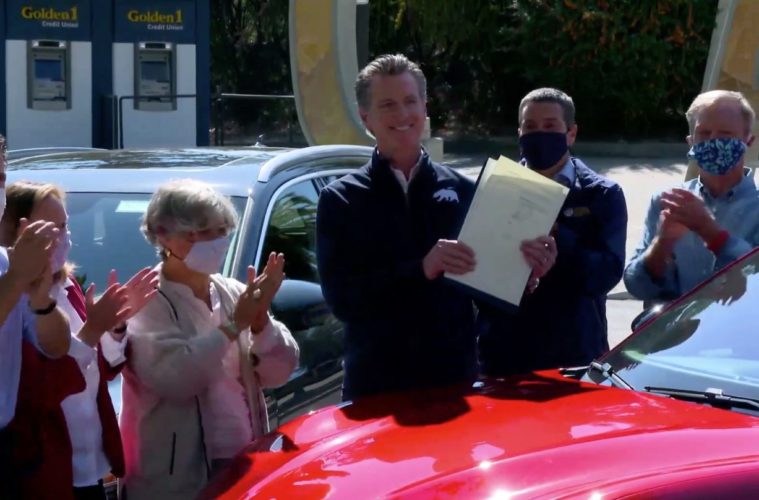With an aggressive move aimed at cutting the state’s greenhouse gas emissions, California Gov. Gavin Newsom signed an executive order that will ban the sale of all new gas-powered cars in California by 2035.
NEW: We’re facing a climate crisis.
We need bold action.
CA is phasing out the internal combustion engine.⁰
By 2035 every new car sold in CA will be an emission free vehicle.Cars shouldn’t give our kids asthma.
Make wildfires worse.⁰
Melt glaciers.Or raise sea levels.
— Gavin Newsom (@GavinNewsom) September 23, 2020
In a Tweet Wednesday, Newsom indicated the gas car ban in California would help improve the health of millions of people across the state, while providing environmental protection:
“NEW: We’re facing a climate crisis. We need bold action. CA is phasing out the internal combustion engine. By 2035 every new car sold in CA will be an emission free vehicle. Cars shouldn’t give our kids asthma. Make wildfires worse. Melt glaciers. Or raise sea levels.”
On Wednesday, Sept. 23, Newsom signed Executive Order N-79-20, which will help California toward its goal of becoming a carbon-free economy by 2045. Specifically, Newsom’s newest order “directs state to require that, by 2035, all new cars and passenger trucks sold in California be zero-emission vehicles.”
In his executive order that will eventually ban all new gas cars in California, and could also halt hydraulic fracturing permits by 2024, Newsom says that it’s California’s responsibility to find achievable transportation advancements that are accessible to all residents.
“The state must prioritize clean transportation solutions that are accessible to all Californians, particularly those who are low-income or experience a disproportionate share of pollution,” the order reads.
After weeks of record-breaking heat in Los Angeles County, massive wild fires across the West Coast, and increasingly poor air quality in California, climate change became a subject of focus during Newsom’s Wednesday conference.
“Of all the simultaneous crises that we face as a state, and I would argue as a nation, for that matter from global a perspective, none is more impactful, none is more enforceable, than the issue of the climate crisis,” he said. “That’s exactly what we’re advancing here today — a strategy to address that crisis head on.”
Currently, the state estimates that California’s transportation sector contributes more than half of all of California’s carbon pollution, 80 percent of smog-forming pollution and 95 percent of toxic diesel emissions.
In 2019, California registered more than 26 million vehicles, according to the California Department of Motor Vehicles.
During the conference, Newsom highlighted a few automobile manufacturers he said were helping lead the way into this statewide transition.
“I want to thank, in particular, a number of automobile manufactures that, ‘get it’, and are starting to get it done, led by Bill Ford and Ford — they have been a leader in this space,” Newsom explained. “They’re not willing to suffer the fate of a future of dirtier air, dirtier water, and more climate disruption. Bill Ford gets it, partners that he was able to bring along — Volvo, BMW, Honda — they ‘get it.'”
Mary D. Nichols, chair of the California Air Resources Board, spoke during the governor’s conference.
“We know we have an obligation to clean up the air and to make it as clean as it can be and to be ahead of the curve when it comes to technologies knowing where industry can go,” Nichols said.
This major announcement will not prevent any Californian from owning, trading or selling a gas-powered vehicles after 2035.
Advertising disclosure: We may receive compensation for some of the links in our stories. Thank you for supporting Irvine Weekly and our advertisers.

